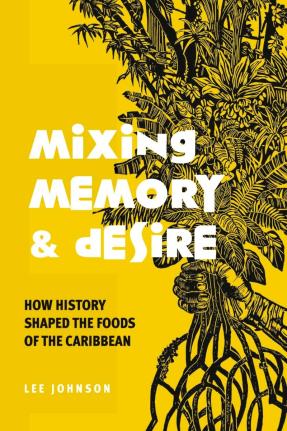Charting Caribbean history through its gastronomy
Loading article...

Bon apetit! Lee Johnson’s Mixing Memory & Desire: How History Shaped the Foods of the Caribbean is definitely a delicious confection. Every chapter is a journey for your mind and your taste buds. Johnson has done an impeccable job, offering a detailed but digestible history of the Caribbean in just 24 chapters.
Johnson’s irreverent tone throughout the book pokes fun at the absurdity of colonial sensibilities while also providing a stark perspective of the reality of plantation lifestyles. He tackles difficult topics with clever asides, for instance, the colonisers’ early starvation due to their refusal to eat local foods before showing how these same foods would later reshape both Caribbean and English cuisine.
Starting from the earliest residents of the Caribbean, Johnson describes centuries of regional history through food. He shows that indigenous diet, while much diluted by colonial efforts, remains deeply embedded in today’s Caribbean kitchens. Recurring dishes such as turtle soup, pepper pot, and cassava illustrate this endurance. Johnson not only identifies the varieties of foods and techniques of the peoples who lived in the region throughout the book but links them to diets and practices that would be served at the table of any Caribbean household today.
Who doesn’t love a good barbecue – linked to the indigenous preparation technique of barbecue. Johnson also highlights the resilience of Africans who despite enslavement, covertly introduced staples like yam and ackee that are now central to Caribbean cooking. The many flavours of immigrant kitchens enter the mix, giving us fascinating chapters on garlic and dasheen pork, curry goat, and Syrian bread. Closing off the book with a fascinating focus on Vienna sausage and conch roti, we see the evolution of the Caribbean identity on the plate.
Mixing Memory and Desire is perfect for anybody interested in Caribbean history but especially for a food enthusiast. Representing the Caribbean in 24 bites was a monumental task; however, Johnson delivers a concise and effective narrative history of the Caribbean. He transports the reader from the villages of the Taíno, Kalinago, and Lucayan to the early European settlements, Victorian England, and sixteenth-century Barbadian plantations. By doing so, the reader gets a real sense of the ripples of history that are taking place in the Caribbean. Each chapter delivers more than its title suggests, weaving together ingredients, techniques, and cultural context. His use of illustrations, extracts from regional poetry, songs, and European journals enriches the text and reflects a keen understanding of the colonial and postcolonial Caribbean. The result is a vivid reminder that food has been central to shaping the region’s history.
While this book does an excellent job of articulating the colonial experience of the British Caribbean, there was considerable focus on the ‘big 4’: Barbados, Guyana (British Guiana), Jamaica, and Trinidad and Tobago. Johnson thoughtfully captures the richness of non-European influences like the culinary expertise of Indian, Chinese, and Madeiran immigrants, however, other immigrant contributions receive less attention. Readers looking for a more comprehensive regional overview may find this uneven. Still, Johnson provides a solid framework for understanding how certain ingredients – like onions, and garlic – became staples of Caribbean cooking.
As a Jamaican, it was fascinating to see the similarities and differences of the British Caribbean through food. The unique experiences of each country really highlight our identities and our histories. Johnson’s ability to fold the stories of colonialism, enslavement, indentureship, and the struggles our ancestors faced, with unique anecdotes, and origin stories of our favourite dishes is tantalising.
By grounding each moment in a particular food and taste, Johnson creates a lasting connection that will have the reader engaged until the last page. I would recommend this book to anyone with a general interest in Caribbean history, food culture, or the complex legacies of colonialism. Johnson does more than recount history – he cooks up a vibrant tapestry of memories, flavours, and stories that will linger long after they close the book.
Mia McMorris is junior research fellow at the Centre for Reparation Research, University of the West Indies.